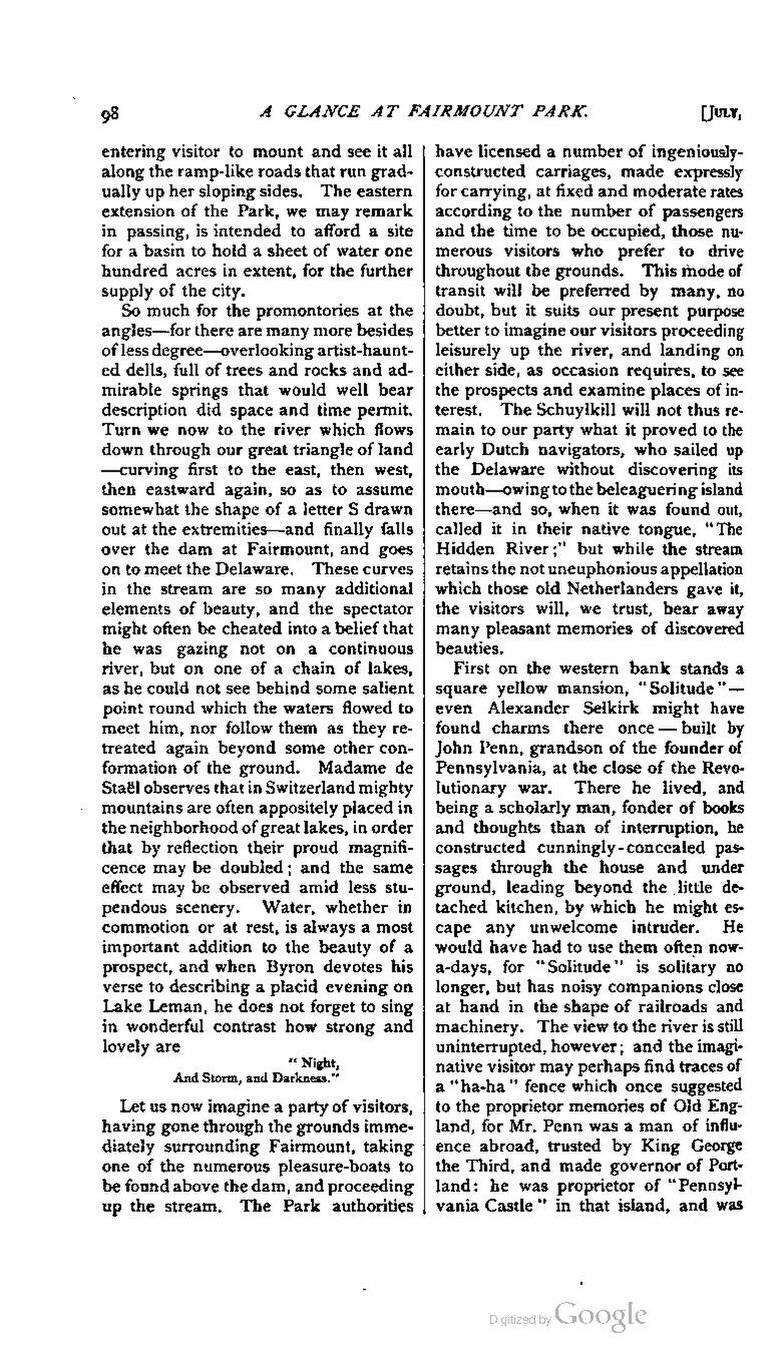entering visitor to mount and see it all along the ramp-like roads that run gradually up her sloping sides. The eastern extension of the Park, we may remark in passing, is intended to afford a site for a basin to hold a sheet of water one hundred acres in extent, for the further supply of the city.
So much for the promontories at the angles—for there are many more besides of less degree—overlooking artist-haunted dells, full of trees and rocks and admirable springs that would well bear description did space and time permit. Turn we now to the river which flows down through our great triangle of land—curving first to the east, then west, then eastward again, so as to assume somewhat the shape of a letter S drawn out at the extremities—and finally falls over the dam at Fairmount, and goes on to meet the Delaware. These curves in the stream are so many additional elements of beauty, and the spectator might often be cheated into a belief that he was gazing not on a continuous river, but on one of a chain of lakes, as he could not see behind some salient point round which the waters flowed to meet him, nor follow them as they retreated again beyond some other conformation of the ground. Madame de Staël observes that in Switzerland mighty mountains are often appositely placed in the neighborhood of great lakes, in order that by reflection their proud magnificence may be doubled; and the same effect may be observed amid less stupendous scenery. Water, whether in commotion or at rest, is always a most important addition to the beauty of a prospect, and when Byron devotes his verse to describing a placid evening on Lake Leman, he does not forget to sing in wonderful contrast how strong and lovely are
"Night,
And Storm, and Darkness."
Let us now imagine a party of visitors, having gone through the grounds immediately surrounding Fairmount, taking one of the numerous pleasure-boats to be found above the dam, and proceeding up the stream. The Park authorities have licensed a number of ingeniously-constructed carriages, made expressly for carrying, at fixed and moderate rates according to the number of passengers and the time to be occupied, those numerous visitors who prefer to drive throughout the grounds. This mode of transit will be preferred by many, no doubt, but it suits our present purpose better to imagine our visitors proceeding leisurely up the river, and landing on either side, as occasion requires, to see the prospects and examine places of interest. The Schuylkill will not thus remain to our party what it proved to the early Dutch navigators, who sailed up the Delaware without discovering its mouth—owing to the beleaguering island there—and so, when it was found out, called it in their native tongue, "The Hidden River;" but while the stream retains the not uneuphonious appellation which those old Netherlanders gave it, the visitors will, we trust, bear away many pleasant memories of discovered beauties.
First on the western bank stands a square yellow mansion, "Solitude"—even Alexander Selkirk might have found charms there once—built by John Penn, grandson of the founder of Pennsylvania, at the close of the Revolutionary war. There he lived, and being a scholarly man, fonder of books and thoughts than of interruption, he constructed cunningly concealed passages through the house and under ground, leading beyond the little detached kitchen, by which he might escape any unwelcome intruder. He would have had to use them often now-a-days, for "Solitude" is solitary no longer, but has noisy companions close at hand in the shape of railroads and machinery. The view to the river is still uninterrupted, however; and the imaginative visitor may perhaps find traces of a "ha-ha" fence which once suggested to the proprietor memories of Old England, for Mr. Penn was a man of influence abroad, trusted by King George the Third, and made governor of Portland: he was proprietor of "Pennsylvania Castle" in that island, and was
